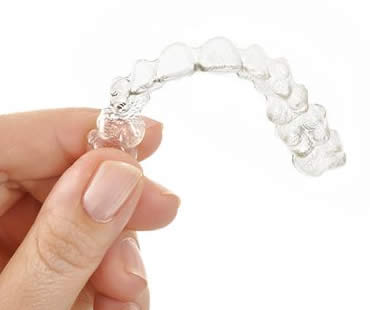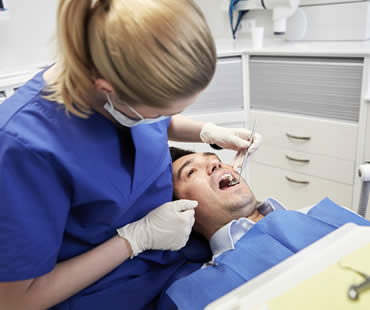
When you’re talking about the oral health of yourself and your family, there is no excuse for neglecting regular dental care. There are various kinds of dentists and specialists, but if you need general dental treatment, a family dentist is a great choice.
Family dentists treat common dental problems and provide maintenance care. Visiting a family dentist is the first line of defense against oral health problems. In addition to regular checkups and cleanings, you will learn preventative techniques to help you avoid issues. If the dentist diagnoses a problem and you need further treatment, a specialist in that area may be recommended to provide additional specialized care.
It is important to find the right family dentist for your needs. Look for advertisements for dentists in your area, and ask friends and family for recommendations. Visit the dental office before finalizing your selection so that you can meet the staff, see the facility and equipment, and learn more about the practice. You should feel comfortable and confident in the office policies and staff, since you are likely establishing a healthcare relationship to last for years.
Also ask about the dentist’s qualifications and experience. Make sure that the services you are interested in are offered, and that the dentist works with specialists to get you the proper treatment for those that are not offered. It is ideal to visit the dentist for minor treatment such as a professional cleaning before switching the whole family to the practice. That way you can see first-hand if the dentist meets your expectations. You may also want to schedule an appointment for your children to ensure the whole family is comfortable.
Once you and your family are confident that the family dentist is right for all of you, switch everyone to the practice and then follow up on regular dental care for the whole family.
Our dental office is located in Ottawa

One of the newest ways to spruce up your look is to correct your teeth with Invisalign. This is an orthodontic solution that allows your teeth to be straightened without having to wear unsightly or embarrassing traditional braces. Invisalign allows you to improve your smile without affecting your eating habits, oral care routine, or self-esteem throughout the treatment process.
Description:
A series of customized plastic aligners are created to wear over your teeth to gradually move them into better position. You are able to see your treatment plan on a computer before treatment even begins, and your dentist monitors progress during checkups to make sure things are changing as desired. The clear aligners with Invisalign are popular because they are nearly invisible, can be removed for cleaning and eating, and are comfortable without causing irritation.
Correction:
Invisalign corrects various dental issues, including crowded teeth, gaps, overbites, underbites, or crossbites. Dentists often advise wearing retainers after treatment to ensure that teeth remain in their new position.
Process:
Once you select a dentist for your Invisalign treatment, an examination and discussion of goals will determine if this type of orthodontics is right for you. If you are a good candidate, a mold will be made of your teeth as well as a three dimensional image to help your dentist determine your treatment plan.
Maintenance:
Invisalign aligners are easily cleaned when removed from your mouth with gentle brushing and rinsing. You can perform your normal oral hygiene routine before returning the aligners to your mouth.
If you need a dentist in Ottawa contact us today

Wisdom teeth are the last adult teeth to erupt into the mouth, generally emerging between the ages of seventeen and twenty-one. They are the third set of molars and are in pairs: two each on the top and bottom arch of teeth. While some patients don’t have wisdom teeth, most do. Many of those who do have them don’t have enough room for those teeth to erupt fully, causing them to be wedged under the back of another tooth, impacted in the gum.
Impacted wisdom teeth are very difficult to clean, and can negatively affect the surrounding teeth. They are highly vulnerable to disease and decay and may lead to tooth pain and damage to adjacent teeth. For these and other reasons, a dentist may recommend that the teeth be extracted through oral surgery as soon as necessary to prevent any problems.
Extraction of wisdom teeth is typically an outpatient procedure done in an oral surgeon’s office. A healthy patient can proceed with a typical surgery, but if any infection is detected, the surgery can’t move forward until the infection is cleared up through the use of a full course of antibiotics. Once the surgery is moving forward, the surgeon’s team will administer some form of anesthesia to numb the area surrounding the tooth or to possibly sedate the patient through IV sedation dentistry.
After the anesthesia has fully taken effect, the surgeon makes an incision to open the gum and to remove any bone that is blocking the tooth from extraction. The tissue connecting the bone to the tooth will be separated and the tooth will be removed. In some cases, the surgeon will have to break the tooth into smaller pieces to make it easier to remove. After thoroughly cleaning the area and removing any remaining debris, the incision will be closed, stitched and packed with sterile cotton gauze to staunch any bleeding.
The surgeon will provide aftercare instructions. Patients should follow these instructions to the letter in order to ensure the best and fastest healing of the surgical site.
We look forward to seeing you in our Ottawa dental office

If your desire is to transform your smile quickly and easily, dental veneers may be the way to go. They hide cosmetic problems that range from minor issues to very noticeable ones. Veneers are customized so that they give you the exact look you want for your new beautiful smile. These restorations, often made of porcelain, offer a variety of benefits to meet many needs.
Straightening:
Crooked, misaligned, or uneven teeth can be hidden with veneers. An impression will be taken of your teeth, which will be sent to a lab so that veneers can be created specifically for you. Once the veneers are finished, the dentist will attach them to your teeth to give you a perfectly straight smile without having to wear braces.
Strengthening:
If you have cracked or otherwise weakened teeth, you do not have to replace them in order to get dental veneers. Once the teeth are stabilized, veneers can be applied and actually act like a splint for your teeth. Veneers create a strong bond with your teeth and can even protect against tooth decay.
Durability:
Another benefit of veneers is their durability, as they can last up to 20 years. Caring for them just means proper brushing and flossing, and regular checkups. No changes to your diet are necessary, and porcelain veneers are stain resistant so they maintain their bright appearance.
Easy procedure:
Getting dental veneers is a painless process, and quicker than many other cosmetic procedures. You can get your new smile in just two or three appointments.
Natural:
Veneers are one of the most natural-looking ways to improve your smile. They look similar to real teeth because they reflect light naturally, and the thin material fits snugly to your teeth.
Versatility:
Veneers correct a variety of cosmetic dental problems. Examples include discolorations, stains, breaks, misalignment, overcrowding, and unevenness. Just about any aesthetic flaw you have with your teeth can be covered with veneers, giving you a brand new beautiful smile.
We treat patients from Ottawa and the surrounding area

Evolution has rendered wisdom teeth useless, and a high percentage of these unnecessary molars eventually require removal. When a wisdom tooth, otherwise known as a third molar, cannot erupt into proper alignment, it is called impacted. Oral surgery to extract impacted wisdom teeth may be considered if you have the following problems:
- Mouth pain and bite problems caused by damage to surrounding teeth created from crowding caused by the extra molars.
- Jaw and nerve damage caused by cysts that form around the impacted wisdom teeth.
- Sinus pain, pressure and congestion resulting from problems with wisdom teeth.
- Inflamed and infected gum tissue created because the area around impacted wisdom teeth is difficult to clean properly.
- Cavities which develop due to infected gums that allow pockets to form between gums, allowing bacteria to grow.
- Alignment issues that alter the effects of braces, bridges, crowns and partial dentures due the crowding created by impacted wisdom teeth.
To diagnose impacted wisdom teeth, your dental professional will look for signs of infection or swollen gums. Your dentist will also inquire about your regular oral hygiene habits. The diagnosis of impacted wisdom teeth can be confirmed with dental x-rays, which may also reveal damage to the other teeth or jawbone.
When making a decision with your dentist about wisdom tooth extraction, it’s important to consider your age. Typically third molars erupt between the ages of 16 and 25 years. Younger patients experience considerably fewer complications with oral surgery for wisdom tooth extraction than older adults.
If your dental professional recommends removal due to the diagnosis of an impacted wisdom tooth, ask for a referral to a qualified oral and maxillofacial surgeon to ensure a successful and complication-free oral surgery.
We treat patients from Ottawa and the surrounding area

Obstructive sleep apnea is a condition created when a portion of the upper airway is blocked, causing breathing interruptions during sleep and low blood oxygen levels. As many as 20% of adults are affected by mild obstructive sleep apnea, while one in fifteen suffers from more severe apnea.
Symptoms of obstructive sleep apnea include snoring, extreme daytime drowsiness, restless sleep, high blood pressure, depression, problems with mental function, as well as a host of other mental and physical concerns. Left untreated, obstructive sleep apnea can lead to a long list of serious medical conditions, including hypertension, heart attack and stroke.
If you have been diagnosed with obstructive sleep apnea, your doctor may initially treat the condition with a CPAP device that you wear while sleeping. While a CPAP machine will reduce the obstruction to the airway, it is not a cure and will only be effective during use. Other non-surgical treatment recommendations may include the wearing of mouthguards to reposition the jaw, sleep position changes, or weight loss.
Tongue muscle advancement involves moving the bony attachment of the tongue muscles, and can be combined with palatal surgery to reduce excess tissues. This therapy may also include removing enlarged tonsils and nasal surgery. These treatments are most often used for milder cases of obstructive sleep apnea.
However, if these treatments do not work or for more severe cases of obstructive sleep apnea, oral surgery offers solutions to correct apnea. Maxillomandibular Advancement is a procedure that repositions the upper and lower jaw and chin to open the airway. This treatment is highly successful and offers the greatest chance of permanent correction in moderate to severe cases of obstructive sleep apnea.
For more information about how surgical therapies and treatments can be utilized to address your obstructive sleep apnea, consult with a qualified oral and maxillofacial surgeon.
Our dental office is located in Ottawa







